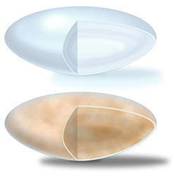Cataracts

What is a cataract?
 A cataract is a clouding of the normally clear lens of the eye. Cataracts are so common that everyone will eventually develop a cataract if they live long enough. Vision loss from cataracts is gradual, which is why many patients have difficulty noticing the early symptoms. The length of time for a cataract to develop can vary from a few months to several years. Patients with cataracts usually describe a blurring or clouding of their vision and in later stages may describe it as seeing through a piece of wax paper. Some report poor night vision, double vision in one eye, or a sensation that one just cannot get enough bright light to read. Glare and difficulty with night driving are also commonly caused by cataracts.
A cataract is a clouding of the normally clear lens of the eye. Cataracts are so common that everyone will eventually develop a cataract if they live long enough. Vision loss from cataracts is gradual, which is why many patients have difficulty noticing the early symptoms. The length of time for a cataract to develop can vary from a few months to several years. Patients with cataracts usually describe a blurring or clouding of their vision and in later stages may describe it as seeing through a piece of wax paper. Some report poor night vision, double vision in one eye, or a sensation that one just cannot get enough bright light to read. Glare and difficulty with night driving are also commonly caused by cataracts.
Cataracts cause progressive, painless loss of vision. The lens clouds naturally as we age, so people over the age of 65 usually see a gradual reduction of vision.
Why do cataracts develop?
For most people, cataracts develop because of a natural aging process in the lens itself. In younger people they can result from an injury, certain medications such as long-term steroid use, or illnesses such as diabetes. Prolonged exposure to ultraviolet light may also play a role in the formation of cataracts. Studies have also shown that people who smoke cigarettes have a higher risk of developing cataracts than non-smokers.
What are the symptoms of cataracts?
Some indications that a cataract may be forming are:
- Blurred or hazy vision
- Double vision
- Poor vision in bright light
- Seeing halos around lights
- Difficulty reading small print
- Night vision difficulty
- Glare, difficulty driving
- Decreased depth perception
- Yellowish tinged vision
Will new glasses help people with cataracts see better?
Sometimes they do and sometimes they don’t. During a complete eye examination, we evaluate vision and the total health of the eye, also screening for other disorders like glaucoma, macular degeneration, and diabetes. This allows us to determine whether a change in eyeglasses would provide a significant improvement in vision. When cataracts become severe, even new glasses will not help because the eye is seeing through a cloudy internal lens that cannot be corrected with glasses.
Can cataracts be reversed or prevented?
Wearing ultraviolet protecting sunglasses and a hat with a brim to block UV sunlight may help to delay cataracts. Researchers also believe good nutrition can help reduce the risk of age-related cataracts. They recommend eating green leafy vegetables, fruit, and other foods with antioxidants.
Currently, there is no medical treatment to reverse or prevent the development of cataracts. Once they form, there is only one way to achieve clear vision again, and that is to surgically remove the cloudy, natural lens of the eye, and replace it with a permanent lens implant.
If you are age 60 or older, you should have a comprehensive dilated exam at least once every two years. In addition to cataracts, your eye care professional can check for signs of age-related macular degeneration, glaucoma, and other vision disorders. Early treatment for many eye diseases may save your sight.
Do cataracts occur in both eyes at the same time?
Generally, cataracts progress at about the same rate in both eyes. However, many people are bothered by cataract symptoms in one eye first. People who have had trauma to an eye, a previous retinal surgery, or history of long-term use of a steroid eye drop may develop a cataract in only one eye.
When should I have my cataract removed?
If visual impairment interferes with your ability to read, work, or do the things you enjoy, then you will want to consider cataract surgery. Cataract surgery is relatively painless and is one of the most frequently performed procedures. Nearly 8,000 cataract surgeries are performed each day in the United States — 3,000,000 per year. It has a very high success rate and more than 90 percent of cataract surgery patients regain useful vision.
Is surgery performed in a hospital or as an outpatient procedure?
At Eye Care Medical Group, cataract surgery is performed as an outpatient procedure. Our cataract surgeries are currently being performed at Central Coast Surgery Center, located in Freedom, CA. The surgical nursing staff is specifically specialized in eye surgery. They are highly skilled in helping patients go through the steps of eye surgery comfortably.
How long does the surgery take?
The cataract surgery itself takes about ten minutes in the operating room. Most patients are at the surgical center for about 90 minutes, including pre- and postoperative care.
Is cataract surgery performed under a general anesthesia?
No, cataract surgery is performed with topical anesthesia only. We provide medications to help patients fully relax. We also administer local medicines around the eye so that patients don’t feel anything during surgery.
Is cataract surgery painful?
Most people say that there is no pain during or after cataract surgery. They may experience a mild scratchy sensation (like an eyelash in the eye) and mild soreness for about 24 hours after surgery. If necessary, Tylenol, ibuprofen, or aspirin may be used as needed.
How is the cataract removed?
The cataract is removed in a ten-minute procedure where a small opening (less than 3mm) is made at the edge of the cornea to allow the surgeon to break up the lens of the eye using ultrasound and remove it in tiny pieces. An artificial lens implant (IOL) made of silicone or acrylic is folded, inserted into the eye, and unfolded in the proper position. The new lens will remain in this position permanently. The new lens can be selected to correct nearsightedness, farsightedness, presbyopia, or astigmatism.
After the surgery will my cataract come back?
After cataract surgery it is impossible for the cataract to come back because the lens of the eye, where the cataract develops, has been removed. The new lens implant will last a lifetime and never need maintenance or replacement. Weeks, months or years after the surgery, some patients experience a decrease to their vision. This sometimes happens because the lens capsule becomes cloudy or wrinkled, blurring the patient’s vision once again. This affects about 1 in 3 people within 5 years of having cataract surgery. It is sometimes called an “after cataract” or secondary membrane.
Treatment of this clouding is performed using a laser in a simple and painless outpatient procedure. The procedure is called a YAG capsulotomy and takes less than 10 minutes. Vision improvement is quick, and the patient can resume normal activities immediately.
Will I need glasses after surgery?
Our goal for you after cataract surgery is to decrease your dependency on glasses. With a standard lens implant you will need glasses for reading, intermediate, and possibly distance vision after cataract surgery. With a premium lens implant, we can greatly decrease your dependency on glasses.
During cataract surgery, artificial lenses are implanted in the eye to replace the cloudy natural lenses. These artificial lenses, known as intraocular lenses (IOLs), were once only able to correct distance vision, leaving patients dependent on eyeglasses or contact lenses for near vision. Many cataract patients, in addition to suffering from either nearsightedness or farsightedness, also suffer from presbyopia, which is a natural change to the eyes that occurs as we age.
Before premium lenses were available, patients were unable to see clearly at both near and far distances without the use of eyeglasses or contact lenses. Early lens implants were monofocal, meaning that they had only one focal point and could not adjust to varying distances.
New advances in technology have allowed for the development of multifocal IOLs, which let patients see clearly at all distances, and can correct astigmatism as well. Premium lens implants are ideal for cataract patients who are also suffering from presbyopia and want a replacement lens that provides a full range of clear vision.
There are several different types of premium lens implants available for cataract patients. The most effective lens depends on each patient’s individual preferences and goals for their vision. Your doctor will work with you to decide which lens is best for your individual eyes to help decrease your dependency on glasses so you enjoy long-lasting, clear vision at near, intermediate and far distances. To speak with one of our doctors and discuss your options for cataract replacement lenses, please call us today to schedule a consultation.
What restrictions will I have after cataract surgery?
Immediately following surgery, we recommend restful activity while the effects of anesthesia wear off. Eating, watching TV, napping, and walking around the house are acceptable. Patients should begin administering their postoperative eye drops when they arrive home from surgery. For the first few days following surgery we would like you to take it easy. This means no heavy lifting, bending, or straining (anything over 20 lbs, someone else should pick up). There are other restrictions, which will be fully discussed with our staff before and after surgery. For more information about restrictions after cataract surgery, please contact our office.







Please contact our office directly at 831-476-1298 to schedule an appointment, or for more information about our services click here